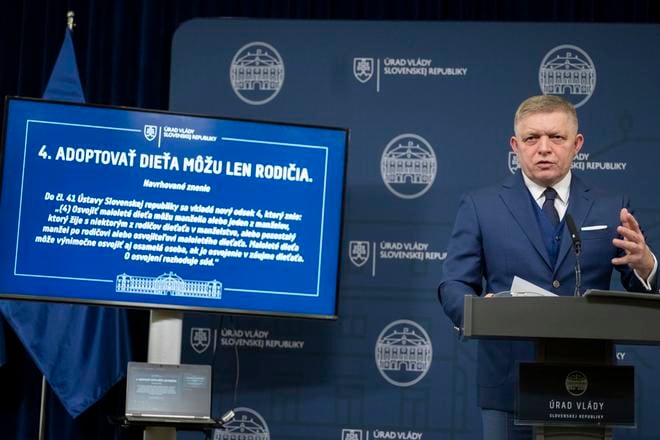Prime Minister Robert Fico has outlined plans to amend Slovakia’s constitution, framing the move as a defence against progressivism. His proposals include defining gender strictly as male and female, limiting adoption to married couples, and asserting that EU laws should not override national legislation.
Speaking at a press conference, the Smer leader denied trying to distract from domestic challenges, insisting that the government was “fulfilling its obligations.”
One of the most contentious changes would amend Article 7 to prevent EU legal acts from taking precedence over the constitution. “If the constitution states that marriage is between a man and a woman, no regulation can override that,” Fico said.
The European Commission swiftly pushed back. Michael McGrath, EU commissioner for the rule of law, reiterated that the primacy of EU law is “not open for debate.”
The EU Court of Justice has upheld the primacy of European law over national legislation in multiple rulings, despite the principle not being explicitly enshrined in EU treaties.
Against LGBT+ people
Fico wants to add a constitutional clause defining gender as biologically male or female, with legal gender changes allowed only in “serious cases.” He also proposes tighter controls on school curricula, requiring parental consent for lessons outside the state framework.
The draft would also block non-married couples from adopting, reinforcing Slovakia’s existing stance on family law.
The final proposal seeks to guarantee equal pay for equal work between men and women by adding a new clause to Article 36.
Fico will need the opposition
Fico insists that he will only proceed if there is enough support in parliament, where his ruling coalition has struggled to pass even routine measures.
“I have already had professional, not political, discussions with the Christian Democratic Movement (KDH),” he said, adding that the draft will undergo interdepartmental review for a month before any legislative steps are taken.
Unlike the two liberal opposition parties, Progressive Slovakia and Freedom and Solidarity, former prime minister and populist opposition politician Igor Matovič (Slovensko) said that he and his MPs would back the proposals only if they came from the Christian Democratic Movement (KDH) rather than Fico.
“We will not vote for any proposal put forward by Fico,” Matovič said. “But we recognise the importance of these issues in resisting the progressive excesses seen in other Western countries.”
If there is enough support, Fico aims to introduce the bill in March. He needs 90 votes to change the constitution. However, his coalition might lose its slim majority of 76 votes soon, meaning that he will need to seek support among the opposition.
Analyst Tomáš Koziak doubts the changes will pass, calling them a distraction. According to him, Fico is using the debate to divert attention from his government’s mounting challenges. Koziak also noted that the proposals are likely to divide opposition parties.
“Fico is trying to drive a wedge into the opposition,” he told the Pravda daily.


 Prime Minister Robert Fico (Smer) gestures during a press conference on the topic "Constitutional Barrier Against Progressivism" in Bratislava on Monday, January 27, 2025. (source: TASR - Martin Baumann)
Prime Minister Robert Fico (Smer) gestures during a press conference on the topic "Constitutional Barrier Against Progressivism" in Bratislava on Monday, January 27, 2025. (source: TASR - Martin Baumann)